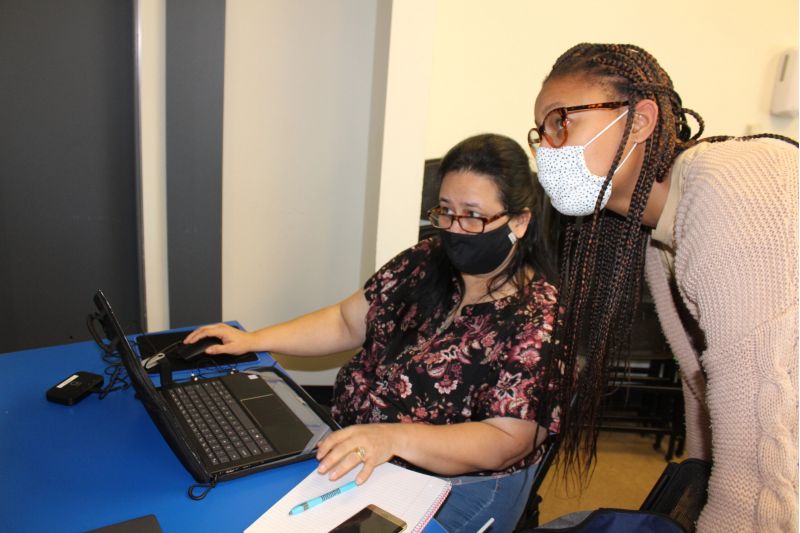How Paycheck Advance Products Hurt Low-Income North Texans

Got 5 minutes? Send a comment in support of basic cost transparency for earned wage loans to the Consumer Financial Protection Bureau before their deadline of August 30. It is a first step in addressing troubling practices, but an important one. Click here to get started.
Across the United States, millions of people work full time but don’t earn enough money to cover their basic needs. When they encounter a crisis or an unexpected expense, they often don’t have the funds they need to recover. Many turn to paycheck advance products, also known as “earned wage” loans, which can have devastating effects on their financial security.
At United Way of Metropolitan Dallas, we lead and invest in programs that encourage financial security. The ability to earn a living wage and stay out of debt directly supports our mission to improve access to education, income and health. Part of that work involves raising awareness of predatory loan practices and offering low-income workers alternatives to expensive payday and earned wage loans.
Keep reading to learn more about earned wage loans, why they are such a problem in low-income communities and what we can do about it.
What are paycheck advance products?
Paycheck advance products, also known as earned wage access products, are loans that allow working Texans to get an advance on their expected wages before their scheduled payday. Companies that provide the products, usually through cellphone apps, can market their loans directly to consumers or through partnerships with employers.
These types of paycheck advance products have become increasingly common in the U.S., as low-income workers have come to rely on cash advances in emergency situations and even to pay for necessities like utilities and groceries.
According to research by the Consumer Financial Protection Bureau (CFPB):
- More than 7 million workers used earned wage products to access approximately $22 billion in 2022.
- The earned wage market is growing rapidly: The number of transactions processed by these providers grew by more than 90% from 2021 to 2022.
- Workers took out an average of 27 paycheck advances per year using these apps—more than twice per month—with an average transaction amount of $106.
What are the dangers of these products?
On the surface, earned wage access products are attractive to workers who simply need to bridge the gap between paychecks. However, these products work much like predatory loans, trapping borrowers in a cycle of debt.
The earned wage access market in Texas is currently unregulated, so these companies can charge exorbitant fees and interest rates. They claim the products are “free,” but the data shows that “free” comes with a pretty high price tag.
Here are more insights from the CFPB, which focused its research on the advance products offered in partnership with employers:
- The annual percentage rate for a typical employer-partnered earned wage cash advance is 109.5%.
- More than 90% of workers paid at least one fee in 2022 when employers do not cover the costs.
- Most fees are for expedited transfers, which range from $1 to nearly $6.
- Many borrowers pay a monthly subscription fee (as much as $14.99) and often make payments that providers characterize as “tips.”
Fees and high interest rates make earned wage access products a significant problem for low-income North Texans who are looking for ways to access a quick loan. While getting an advance on their paycheck may help in the moment, fees and interest rates of nearly 110% mean workers are losing significant amounts of money just to access their own earnings.
For workers like Myrisha, earned access wage products seem like a lifeline but are actually a trap. A resident of Central Texas, she recently lost nearly everything when a tornado struck her neighborhood.
“I was just getting to a place where I was somewhat comfortable and then tragedy struck,” she said. “I had almost nothing in my account, my food had gone bad, severe damage was caused to my car, the electricity bill was extremely high, and I had no way to pay for any of it. To make matters worse, I had just been denied food stamp assistance because I made $71 too much. With all that I had no other choice but to turn to payday loans.”
Myrisha accessed funds from her paycheck ahead of payday, using cash advance apps. But mere days after she borrowed the money, she had to repay the full amount once she got her paycheck—leaving her with little to no money on payday.
“I had to accept the loans again to pay bills and get food, just for it to reoccur every two weeks,” she said.
She reached out to United Way of Central Texas for another option.
“Had I not applied for assistance with United Way, I would still be in that debt trap,” Myrisha said. “United Way helped my family and I get a fresh start. My families’ bills were covered and that helped me get ahead.”
What is behind this problem?
For many of our North Texas neighbors who rely on paycheck advance products, low wages are the core issue. Workers are putting in the hours but simply not making enough to get by.
The federal minimum wage has been stuck at $7.25 since 2009. For full-time workers, this equates to only about $15,000 a year.
Across the U.S., 23% of workers—or nearly one in four—earns low wages, defined as less than $17 an hour. Texas is the state with the highest number of workers earning low wages, with more than 4.5 million individuals bringing in less than $17 an hour.
How can low-income workers protect themselves?
Paycheck advance products often seem like the most logical and convenient solution for workers who need an advance on their pay. And the fact that many employers offer them makes them seem trustworthy. But workers should explore other options for getting cash before they commit to the high interest rates and fees associated with earned access wage products.
At United Way of Metropolitan Dallas, we lead the Impact Loan Initiative, which offers safe and affordable alternatives to earned wage access products. Our partner agencies offer loan products such as:
- Impact Loans: provide short-term financing of up to $1,500 for a maximum term of 15 months and at a fixed rate of 12%
- Credit Builder Loans: 0% loan reported to all three credit bureaus to help workers build credit; borrowers make 12 monthly payments of $5
- Predatory Conversion Loans: Designed to pay off payday and auto title lenders by allowing borrowers to convert to a low-interest, loan amount up to $4,000
- Emergency Loans: Loans of $500 to $2,500 for major financial needs such as vehicle repairs, urgent home repairs, appliance purchases, apartment deposit, medical bills or funeral expenses
- Small-Dollar Loans (up to $2,500): These loans are accessible to Texans with lower credit scores or no credit and have an APR that does not exceed 35%
Click here to learn more about our Impact Loan Initiative and our partners’ low-cost loan options.
At United Way, we also offer a variety of financial products and services through our Pathways to Economic Mobility program, including:
- Free Tax Prep services: delivers free tax preparation to ensure families can maximize their tax refunds and build a foundation for savings
- Affordable Loan Initiative: offers small loans that are fair and flexible and do not require a credit check, creating an alternative to predatory payday and auto loans
- Dollars for College: expands access to affordable, long-term savings accounts for low- and moderate-income families
- Financial Inclusion Roundtable: connects low- and moderate-income families to insured deposit accounts, fair credit and quality financial capability programs
- Financial navigators: deliver individual financial guidance and education to ensure local families can meet their financial goals
To learn more about these products and services, visit our Resources page and click “Financial Resources.”
Finally, we are also a member of the Texas Fair Lending Alliance, which ensures that lenders and borrowers can make informed financial choices. The coalition offers resources to assist borrowers who are having trouble with predatory loans. Click here to learn more.
Together, We Can Support Low-Income Neighbors
As a community, we can take steps to ensure our low-income neighbors can hold onto more of their hard-earned wages.
The paycheck advance products issue, also called earned wage access, is a hot topic in our community. A growing number of Texans are calling for reform to the state’s earned wage access market. Here are two ways you can voice your support for this important issue:
- Submit a comment to the Consumer Finance Protection Bureau by August 30: The CFPB has proposed rule changes to the paycheck advance market that would better protect workers and save them money, in part by clarifying that these products are loans and must show costs in a clear and transparent way, consistent with requirements for other lenders. The agency is taking public comments on the proposed rule change now through the end of the month. Click here to voice your support for these important changes.
- Join United Way in our advocacy efforts. The earned wage access issue is one we’re monitoring for the 2025 Texas legislative session, which begins in January. Sign up for our Advocacy Alerts now, and we’ll keep you informed on the latest developments throughout the session and let you know when and how to contact your lawmakers so we can make the greatest collective impact.
Tags

Be Part of the Change
Together, we’re improving access to education, income and health so all North Texans can thrive. Join the Live United movement and invest in lasting change today.


